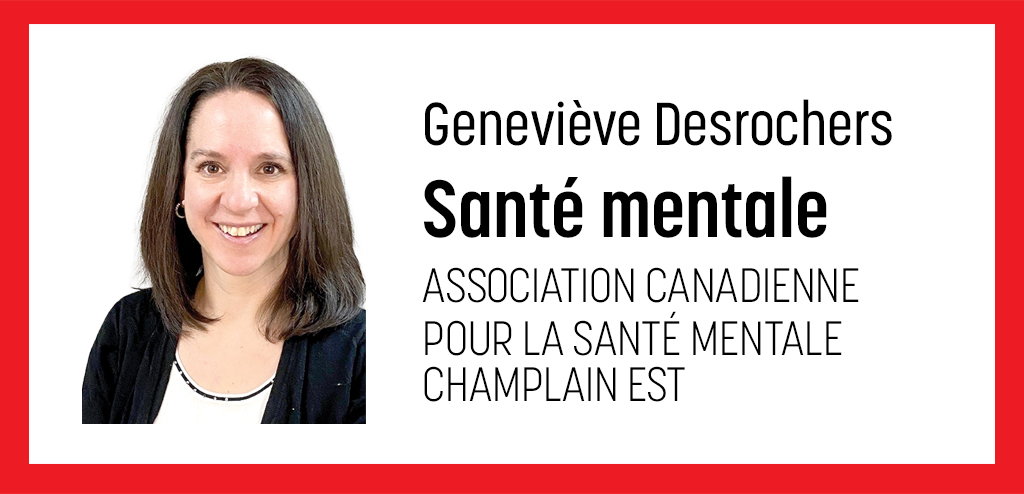Presented by: Canadian Mental Health Association Champlain East
The magic of the Christmas holidays. While real to some, this magic can also be a thin veneer of unpleasant emotions that overshadow the festivities. In fact, 52% of people in Canada reported feeling isolated, experiencing symptoms of anxiety and depression while on vacation. And for someone who’s already living with depression or anxiety, the holidays can make things worse.
Here are five factors that can make the holiday season feel like too much because it becomes extra stress and mental health overload. Do you recognize yourself in these situations? If so, here are some tips to help you protect your inner peace.
- Having (too) high expectations
The idea of the “ideal” holiday season is all over popular culture. We all know the alleged sequence of events. We feel the pressure of obligations. We are confronted with this ideal image. Are we happy enough? Are we doing it right? Perhaps the Christmas season is not part of your cultural tradition, but you feel an obligation to celebrate it or you will feel left out. Or maybe the holidays are part of a tradition you reject. If this is the case :
- ignore people who judge you and compare you to the curmudgeon. You don’t have to celebrate the holidays.
- determine if you feel oppressed by your own traditions. If so, now is the time to take the time and space to reinvent yourself. It could be like declining an invitation (“I can’t come this year”) or setting other boundaries (“I can come to dinner, but I can’t stay over night”).
- don’t let yourself be dominated by what happened in the past. The holiday season is yours and you can take control of it.
- ask yourself if you enjoy the holiday season. What things do you dislike or hate? Now that you know what you don’t like, choose what you like! Don’t let your traditions, or those of others, dictate how you should celebrate the holiday season, or even dictate whether you should celebrate it.
- overflowing with joy
Eat too much, drink too much, spend too much. In short, exaggerate. It seems that the holidays go hand in hand with this idea. Compulsive consumerism and cheerfulness can have detrimental effects on your mental health, especially if you’re struggling financially. Consumption has a price that is not within everyone’s reach. If this is your case…
- Putting too much on the plate
You could organize a gathering this year for the first time, or the 50th. You may feel responsible for the entertainment and pleasure of others. You may feel that your job is to please everyone and make sure everyone has enough fun and enough joy during the holidays. There’s a lot of pressure. If this is your case…
- delegate tasks. If you feel it’s your job to make everything perfect, it’s not. Ask for help from others. It’s their holiday season too!
- take a break from organizing or retire as an organizer altogether. Ask someone else to organize the celebrations this year.
- prevent the outbreak of conflicts. If you know certain topics automatically ignite discussions, be polite, but be clear about your boundaries and expectations.
- Attend too many events
Sometimes the Christmas period is intensely social, and all the parties, small get-togethers and family dinners can create relational dynamics marked by discomfort and even conflict. Tension can mount quickly. Because our Christmas traditions go back to childhood, we may feel pressured to play roles we no longer feel comfortable with. If this is your case…
- remember that only you can choose what makes you happy.
- Plan breaks that involve finding a quiet place to take a breather, call friends, or take a short walk if you accept an invitation but are afraid of feeling overwhelmed at the event.
- remember that you have the right to leave an event if you do not wish to stay longer. Tip: Plan your own transportation so you can arrive and depart when you want.
- remember that you are not obliged to participate in any event. Give yourself permission to do what’s best for you.
- feel abandoned to one’s fate
In Canada, more than one in ten people often or always feel isolated. Additionally, half of those experiencing loneliness have worse overall mental health. Your connections to others and your community are key protective factors for your mental health, so loneliness isn’t something you can ignore. The holidays can be especially difficult if you feel alone. If this is your case…
- do something special for yourself: cook your favorite meal, go to the movies or do a holiday project.
- volunteer. By supporting others, you can also improve your mental health, as well as have the ability to bond with other people.
- connect with others looking to make connections. There are tons of groups of people – in person or online – looking for a community to belong to.
- do things the old-fashioned way and write letters and holiday cards with invitations to call each other on the phone.
The holidays aren’t magical for everyone, as the loveliest of seasons can be fraught with pitfalls and situations that take a toll on your mental health. Prepare yourself. If you dread the holiday season, don’t let it get to you. Take control. Take care of you.
NEED MORE HELP?
To find out more about the support services and resources available in your area, contact a community organization such as the Canadian Mental Health Association (CMHA).
The information provided is not a substitute for professional advice. If you need advice, consult a qualified healthcare professional. For more information or if you would like to access our services at CMHA, please call 1-800-493-8271 or visit our website at www.cmha-east.on.ca.
If you are contemplating suicide, call toll free 1-833-456-4566 (in Canada) or dial 911.


